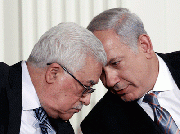
|
| Israeli Prime Minister Benjamin Netanyahu (R) and Palestinian President Mahmoud Abbas speak during an event about the Middle East peace talks in the East Room at the White House in Washington September 1, 2010. REUTERS/Jim Young |
But while the talks may serve immediate American and Israeli interests they will do nothing for the cause of peace.
In fact, the mere announcement that talks will resume has emboldened the Israeli prime minister to declare that settlement-building will continue and to demand Palestinian recognition of the Jewish character of the Israeli state as a precondition for any future agreement. So, at the same time that it has pressured the PA into dropping its preconditions for participating, the U.S. has allowed Netanyahu to impose his own preconditions on the whole process with impunity.
The Palestinians have already made clear that they will withdraw from talks should Israel not extend its freeze on settlement construction when it expires on September 26. But regardless of how long they last, the talks will have already started a process that will only perpetuate the Israeli occupation. This is simply the old new story of the ‘peace process’ – which, since it started in 1993, has consolidated Israeli control over the Palestinians while brutally crushing their resistance.
Arab complicity
Responsibility for the decision to participate – despite overwhelming Palestinian opposition – must rest with the PA. But, it is important to recognize the growing American and Arab complicity in pushing the PA to surrender.
Arab countries have collectively and individually exerted tremendous political and financial pressure on the PA to enter into direct talks. Qatar, the country that presided over the special Arab League committee that gave the green light for the talks, has played a pivotal role in negotiating their “terms.”
For their part, Jordan and Egypt, driven largely by their own self-interests, have long argued for an immediate resumption of direct talks under the guise that they would give the U.S. an opportunity to support the Palestinian cause.
In reality, Arab support for the PA has always been conditional on the Palestinian leadership’s willingness to appease the West and the divisions between Fatah and Hamas have made the threat of Arab states withholding political support all the more real for the PA. But, the main pressure has been financial. Arab states have paid only $115 million of the $550 million pledged to PA institutions, leaving it with very real fears of financial collapse. Western donors have also failed to deliver on aid promises, much of which is linked to “progress” in the “peace process.”
And when Obama sent a letter to the Palestinian leadership last month threatening to withdraw U.S. recognition of the PA, the authority found itself facing the prospect of political and financial isolation – much like that experienced by the late Yasser Arafat when Arab and Western countries left him and the Palestinians at the mercy of an Israeli invasion and siege.
No mandate, no surrender
Despite this, many within the Palestine Liberation Organization (PLO) and the Fatah movement advised the PA not to succumb to American threats and Mahmoud Abbas would have gained much popular support had he resisted. But the PA leader and some of his aides feared that the international backlash from not participating would cost them and the Palestinians dearly.
However, few Palestinians outside the narrow decision-making circle agree with them and the only reason why the decision has not yet been met with an outpouring of anger is because Palestinians are convinced the talks will not result in an offer that could lead to a Palestinian compromise.
As one PLO official who asked not to be named told me: “We are not afraid of the outcome of the talks. There is nothing Abu Mazan (Abbas) would or could accept. But going to the talks has undermined our battle to isolate Israel.”
More than 700 prominent Palestinians in the West Bank, including leaders of all the PLO factions, signed a statement opposing the resumption of talks and called for a protest rally to be held on September 1 – the day negotiations resumed in Washington. But a press conference held by opponents of the talks was interrupted by security forces, in a crackdown that has been widely criticized and interpreted as revealing the depth of the divisions generated by the decision to participate.
Abbas later expressed his respect for the opposition and ordered an investigation into the incident, but this “rebellion” by leading Palestinian figures will not go away quietly. The PA leader will be entering negotiations without any organizational or popular backing, let alone a mandate. In fact, the only mandate Abbas will have should Netanyahu try to impose his vision of a fragmented Palestinian state deprived of any real sovereignty over land or resources, is to say no.
With unconditional U.S. support for Netanyahu’s position, Palestinian hopes must lie in the failure of the talks, as “success” would be equivalent to Palestinian surrender.
So while American bullying has succeeded in bringing a weakened Palestinian leadership to the negotiating table, it will not succeed in subduing the Palestinians who have shown in the past that they can lead their leadership into rebellion.
Lamis Andoni is an analyst and commentator on Middle Eastern and Palestinian affairs.






Leave a Reply